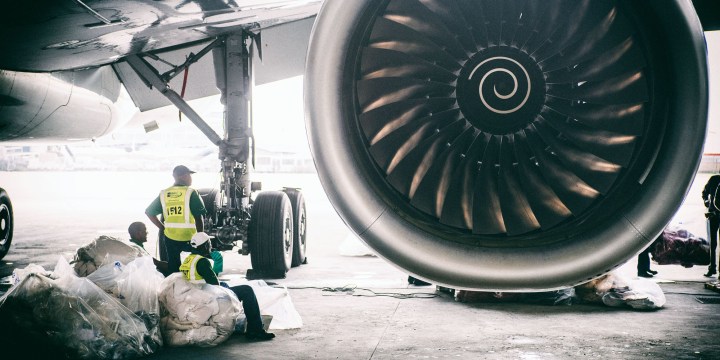BUSINESS MAVERICK
Meals ban on domestic flights fuels job loss fears in South African aviation catering industry

Transport Minister Fikile Mbalula, who is responsible for the aviation industry’s compliance with Covid-19 health and safety protocols, has not amended and gazetted new lockdown regulations that reflect South Africa’s move to Level 1 on 1 March 2021. For now, meals are banned on domestic flights. Aviation industry caterers say this will lead to job losses.
Catering companies have warned of further devastation and job losses in South Africa’s aviation industry because the government continues to prohibit airlines from providing in-flight meals to passengers travelling domestically — even though lockdown regulations have been substantially eased.
The aviation industry, reeling from the skies being shut down in early 2020 as Covid-19 swept the world, is still forced to comply with stricter Level 3 lockdown regulations despite the country having been on Level 1 for nearly two weeks.
This is because transport minister Fikile Mbalula, who is responsible for the aviation industry’s compliance with Covid-19 health and safety protocols, has not amended and gazetted new lockdown regulations that reflect SA’s move to Level 1 on 1 March 2021.
In other words, airlines have been left to comply with regulations for “an adjusted Level 3”, which prohibits airlines from serving meals to passengers if they fly domestically. Only bottled water can be on the menu. Passengers can be served chicken or beef and other meals if they are flying to regional or international destinations.
Catering companies that supply in-flight meals to British Airways (operating in southern Africa), Kulula and Airlink have warned that Mbalula’s blunder will be a death knell for the aviation supply chain industry, which is already struggling.
Glenn Orsmond, CEO of Comair, said jobs will be on the line at the company’s in-flight catering unit, Food Directions, if the government continues to ban meals on domestic flights. Food Directions employs about 400 workers and supplies meals to Comair-operated British Airways and Kulula.
“It is devastating because Food Directions survived lockdown levels four, three and two. It was finally looking to invest, grow and sign with international airlines. Food Directions will now need to retrench a lot of people,” Orsmond told Business Maverick, without disclosing the number of affected workers.
Siyathemba Inflight Catering, a company that supplies meals to regional airline Airlink, has recently cut the working hours of its 80 staff by 30% to avert the worst-case scenario of job losses, said its MD Sonette Joubert.
“I was emotional when we were told we couldn’t supply domestic flights. We are a very small airline caterer. The worst part is that we have just recovered from the hard lockdown, which forced us to close,” said Joubert. Siyathemba is still supplying Airlink with meals for its regional flights.
Puzzling government decision
Siyathemba Inflight Catering, Food Directions and Emirates-owned Dnata Newrest are the few players remaining in SA’s airline catering industry.
Air Chefs, a subsidiary of SAA, is not operating because SAA is still fighting for survival through business rescue, and LSG Sky Chefs (owned by Lufthansa) exited SA in September 2020.
More puzzling to Siyathemba’s Joubert and Comair’s Orsmond is that the government allowed airlines to serve pre-packaged meals on domestic flights when SA’s aviation industry reopened in July 2020 after the hard lockdown eased. At the time, SA moved to advanced Level 3.
Said Orsmond: “We are unclear about why it was okay to allow catering for levels three and two, but why it is an issue for level one. In the past, we were in the first and second waves of Covid-19 infections. But we understand that Covid-19 infection numbers have come down. Now might be opportune to resume catering in all flights.”
The catering industry has slammed the handling of lockdown regulations by Mbalula’s department. South Africa moved to Level 3 lockdown on 29 December 2020, but the gazetted regulations detailing the impact of the lockdown on aviation catering services were signed by Mbalula only on 25 February 2021.
This was three days before President Cyril Ramaphosa announced the country’s move to Level 1. The gazette on aviation catering services for a Level 3 lockdown was published on the government’s website on 1 March 2021 — the same day SA moved to a Level 1 lockdown.
The rationale behind the ban
Mbalula’s department was not available to comment to Business Maverick on the rationale behind banning meals on domestic flights, and whether the ban will be reversed under Level 1 regulations.
The South African Civil Aviation Authority (Sacaa), the authority for airlines in SA, is in regular talks with Mbalula’s department about constant changes to lockdown regulations in the transport industry.
Poppy Khoza, Sacaa director of civil aviation, said Mbalula is yet to publish a gazette that is in line with Level 1 lockdown regulations, a process which “is far advanced and a pronouncement on it is expected any time this week”.
Until then, airlines will still have to comply with meal bans on domestic flights.
Khoza believes the ban might stay in place even if the gazette is amended to reflect a Level 1 lockdown.
“In SA, we don’t have long-haul flights. The longest flight we have is about two-and-a-half hours, from Cape Town to Hoedspruit. People can still eat at the airport terminal building before boarding an aircraft. Two hours is a short time for someone to be concerned about being hungry,” said Khoza.
She said the rationale behind banning meals on domestic flights was to minimise the risk of Covid-19 transmission by passengers. “[When meals were initially allowed on domestic flights], it was seen by Sacaa inspectors that some passengers spent most of the time during flight eating instead of wearing face masks and conversing without wearing face masks. This is seen as a risk. It made some people uncomfortable during flights.”
Siyathemba’s Joubert has argued that meals can be served in line with health and safety protocols, including not allowing passengers to eat on board for more than 30 minutes. DM/BM















 Become an Insider
Become an Insider
I can’t shake the feeling that it’s because there’s no opportunity for the governing party’s “business caucus” to profit from updated regulations yet. Perhaps companies involved can murmur about tenders available for supplying chicken tenders to mitigate this.
Please imagine a facepalm smiley here.